Đorđe Jovanović, Serbia (he/him)
18 September 2025
My name is Đorđe Jovanović. It is hard for me to say where I'm from because I have to say I'm from Serbia. I'm actually not from Serbia at all, I was born in Yugoslavia. That country later disintegrated and small countries were created. So, the most accurate answer would be when you ask me where I'm from - I’m from Vojvodina. I have been dealing with the rights of Roma for over twenty years, first in Yugoslavia, then in Serbia, and now at the European level. I am the president of an organisation called the European Roma Rights Centre, which includes, of course, Romani women [because in Serbo-Croatian language the word Roma is a masculine plural].
What does this project mean to you as a Romani man and as a member of the LGBTIQ community?
The RoMagic project means a lot to me. I have been involved in it from the very beginning - from writing, through negotiations with the donor who made this project possible, until now. We are not an organisation that deals with art; we are an organisation that uses law and legal instruments to advance Roma rights. What is specific about the Romani LGBTIQ+ population is their invisibility. It is impossible to legally represent persons who are invisible, who do not exist in the system. Nothing can be legally done for our rights because it is very difficult to define and find all the forms of discrimination that exist against this population. We are not only talking about discrimination that comes from the outside, but also about discrimination within the Romani community. "Coming out" is very difficult in a closed community such as the Roma.
What was it like coming out to your family? Do you notice a difference in how your family treated you then and how they treat you now?
It has been 20 years since I came out and my father, who participated in that process, is no longer alive. The process itself was quite fucked up and difficult because it happened at the end of the nineties when the war was ending in the country I inhabited. Technology was at another level, as my dad would say, it was a different time, truly. Coming out then and saying that you are a member of that community was quite different than it is today. I think that, in the meantime, efforts have been made to make it a little easier today. For sure, at that time people were much more close-minded. I was already financially independent from my family. I told my family then that if they didn't want to have contact with me because of those things, they would be the ones to lose. They would lose contact with their son. I would lose, of course, as well, but they would be the ones to make that choice.
Back then, when you realised what you are and who you are, did you feel fear of yourself?
They didn't have much experience with such situations, and it didn’t prove too difficult for them to accept. What was the problem, and this is, among other things, what we want to achieve with this project, is that there were no "role model" stories and narratives, at that time, that these people could build on. The Romani community is strongly connected with each other; these people are so interconnected and still live with their neighbours, literally together, sharing the space and knowing everything about each other. There are also families and neighbours who may not be having good relationships. This kind of situation could be taken by the families, with whom you have quarrelled for decades, as an argument to discredit your entire family, each of them could say: "What right do you have to say that? your son/grandson is a fag!" Some families like to be proud and show off the achievements of their children and then they encounter difficulties , they would like to be able to say: "He graduated from university, he is educated, he lives here and there", and then the neighbours they are not in a good relationship with can respond with: "But what are you going to do? You can’t be proud of your child when he's a fag!" It was very difficult for my parents and grandparents to answer when someone inevitably asked about me. This community belonged to a broader mentality captured by the saying ‘may my neighbour’s cow die’ (da komšiji crkne krava). This Balkan proverb is a bit darkly humorous and deeply cultural. It expresses a mentality of envy and spite, where someone would rather see their neighbour lose something (even if they themselves gain nothing) than see the neighbour prosper.
For example, my mom goes to church often, a woman asked her how she could support her son when he will go to hell. She was totally taken aback by the question because she didn't know what to answer while she had to deal with it somehow. Of all those people, my grandfather, who was a musician and played a lot in the former Yugoslavia, had the best answer when asked about me: "When I was playing in Croatia, in the resorts in Split, those [gay people] were the finest gentlemen I had ever seen in my life." The other family members didn’t quite know how to deal with this question.
I have known that I am not heterosexual for as long as I can remember. I always very clearly knew that I had absolutely no sexual interest in women. I grew up in a typical Roma settlement, which, as it was arranged in Austria-Hungary, were at the beginning or end of a village. We lived at the end of a street; they had settled there after the Second World War when Tito gave them lots that were registered in the cadastre. Before that they lived a little further out, there was a canal that flows into the Danube and they lived next to it, because it provided them with everything they needed: water; reeds that they could cut to make a roof, for example, on a house; they could catch the fish they ate; they could wash clothes in that canal; everything happened around the canal. A garbage dump was located between the canal where they lived and the new lots they had been allocated. When I was a child, there was no organised garbage collection, so everyone took their garbage there. This is interesting from an ecological point of view, because at that time plastic was not yet widely used and households had nothing to throw away - everything was used. In the village, it was called a threshing floor, where manure and everything else, of organic character, was discarded and later spread over the garden as fertilizer for the plants. Clothes were mended and patched; there was nothing else to throw away.
Households that had rubbish, newspapers, books, old toys and other items were brought there and thrown behind where the Gypsies lived. I grew up there and one of the most interesting things for me as a child was to play on that garbage, because you could find all kinds of things there. You could do research - which garbage came from which house, if children inhabited that house, if they had a boy or a girl, what exactly did they throw away, how old were those children, what did they read, were they people who were from Belgrade and have a summer house in our village on the Danube river , so it was wealthier garbage from wealthier people...
I learned to read and write very early, before I started school. When I was five or six years old, I already knew how to read and write, and I often found novels in that garbage - we in our region of Srem didn't call them comics, but novels. Among other things, there were a lot of comics/novels and newspapers. Several times, but this was first time ever, I came across erotic and pornographic magazines, and all the content in them was heterosexual. When I was little, there were two programs and they didn't run 24 hours a day, the program was well known, the whole village watched one and the same movie, and then we retold the story. So, two television programs and one radio. Until then, I had never encountered content, I did not have any sort of information, I had never even seen movie or anything which would indicate that gay people were around me, so I thought, at the time, that I was probably the only one in the world and I did not have any idea of what is going to happen to me.. Even then, at the age of five, I understood that I should not tell this to anyone, especially not my parents, because I was afraid what they would do. . That was the context and the moment when I first came across erotic magazines which featured advertisements. These were ads, under codes, with men looking to meet women, and, for the first time, I read that a man was looking to meet another man, and for me it was a “wow moment” - I'm definitely not the only one in the world, when I grow up and leave the village for the city, I will be able to meet a guy. I was very excited and happy that it was going to happen at some time in the future.
When I had my coming out, my brother, who was three years older than me, asked me how come, while he understood why I couldn't tell my mom and dad, he asked why I didn't tell him. I answered that it was because he would immediately give me away and they would immediately realise that they should take me to the doctor. God only knows what kind of torture I would have experienced had they taken me to the doctor.
Another option that I knew was open was that apart from the doctors, who obviously would not work, they would take me to a fortune-teller/healer. , because it was very present in our circles - all family problems were mainly exposed and attempted to be solved by a fortune-teller/healer and I thought, as a child, that I did not want to be taken to those fools. There is a very funny anecdote related to the fortune- tellers. My parents lived in the same house with my paternal grandparents, given that they fought a lot, they often sought the help of fortune-tellers. We were children and we were asleep, while they, in order to stop fighting all the adults from the house, walked around the house three times, before dawn, holding a piece of paper, believing that this ritual would help them stop fighting. Even as a child, it seemed to me that this was complete madness. I thought that if I told them anything, they would take me to those same fools who are giving them this nonsense advice.
After coming out, did you stick only to the Roma community, or did you also socialise with others?
hen I came to study in Novi Sad, I mostly had friends who were Roma and only knew a few people who were not Roma. However, among the Roma with whom I socialised, there was no one I knew who had come out, in this sense. In this regard, my first romantic or sexual experiences. were with non-Roma people. The Internet had already been available – the slow, "dial-up” kind – yet still there were various chat rooms where you could meet people. It turned out that being Romani was a big problem for some of these people, which prevented them from having anything with me. Because for some of them, they were already struggling to accept being part of the LGBT community, so they didn’t want to be friends and seen also in a public space with someone who had darker skin and was probably Roma, as that would draw additional attention to them. Some of them said ‘I’m sorry, but that’s just too much for us to handle.
Do you think the LGBTIQ community discriminates against Roma?
Today this is individual, and that relationship depends on the local context, the country, the city, how much the Romani community has been accepted by the society. What I know from my personal experience, as well as from the experience of other people, is that some LGBT clubs still do not allow Romani men and women, so I believe that this barrier still exists today. The fact that you belong to one minority does not mean that you will automatically be accepted by another, and even famous people do not come out on either of these issues - they neither say that they are Roma, nor that they are LGBT.
My experiences are related to post-war Yugoslavia, when we were very closed, we couldn't travel, we needed visas, it was an extremely screwed up society. Now, however, there is greater mobility, people do not need visas, they can visit other countries, thus a lot of the Roma live in the countries of the European Union. I have spoken to LGBT Roma who live in the EU; they told me that it’s a bit easier for them, because they can move more freely and go from one country to another where life might be easier, while people from the Balkans have fewer opportunities, they have to stay where they are.
The biggest problem for LGBTIQ Roma is coming out. They can't live the life they want because that means being financially independent. They cannot live that life with their extended families, especially within communities with predetermined rules. Most of them have to leave that community, which requires resources and various levels of support. Many Romani communities are in rural settlements, which implies that you have to go out into a larger environment, to a bigger city, you need to find a job, support yourself, sometimes you are forced to cut off contact with your community... All of that is very difficult. Most of these people are not educated thus they don't have much choice jobwise, in order to be able to move elsewhere. There is also the issue of discrimination; they cannot find a job because they are Roma, this is all psychologically very difficult. You have to be an extraordinarily strong person to get through all that, to penetrate through all those circles of exclusion and isolation. As a result, I think that the first step, coming out of the closet, is very problematic and that's why a lot of people still live in hiding. A lot of them marry, living in heterosexual marriages that are actually fake. Some of them achieve the once desired emotional or sexual contact with someone in the community or outside the community, but it still remains hidden, as is the case in most European countries.
How do you see the future of the Roma LGBTIQ community?
How to help the LGBT Roma? It is a very complex problem, it is a community that is generally discriminated against on the basis of its ethnicity, and a lot of work needs to be done to overcome this, and only then should we reach out to other sensitive communities, within this already marginalised group, help and empower them, and provide them with an understanding of what they are going through. It is a process that takes a very long time, spanning generations. We see all the problems faced by people who are empowered to come out of the closet. They often end up on the street, engaging in sex work, as one of the few available ways to make money.
Due to the complete invisibility of this group, the decision-makers are not familiar with these problems and that is why, among other things, this project was created, to try, somehow, to help those people, because they are completely invisible, non-existent, leading very hard lives. It is important and necessary for people like me to constantly break through the barriers that exist, and to try to remain as normal as possible during the whole process. Extraordinary strength is needed in order to overcome and do these things, with the question then being how such persons can continue to live - whether they can keep, and to what extent, their Romani identity while living in a community outside of Romani communities. I don't see that all these nuances and obstacles are easy to resolve, but you have to start somewhere, which is what we are trying to do with this project.
Within the Romani movement, there are strong right-wing currents that deny that we exist at all, they claim that this is not present among the Roma, that it does not and, must not, exist. We have to fight within our own community to exist, to want to exist, and at the same time not to become non-Roma. I personally never wanted to stop being Roma in order to be LGBT; I wanted it all to be a part of my personality, for me to accept myself and for others to accept me as well. I did not want to renounce anything. This, in fact, requires a change in the whole of society, which is part of everything we do.
In your opinion, what makes a human being human?
I was born the way I was born. My skin was slightly darker than most of the people I was surrounded by. I was born to like dick, not pussy. I didn't put myself in any kind of framework, I was just born as a human being with these characteristics. I was born in a certain geographical area that placed me in certain framework for being Roma, for being gay... Well, I'm not, I'm just a human being, like everyone else, with certain external and internal characteristics that are specific to me. That makes me human, just like any other human being, and it is completely abnormal for that other human being to say to me: "No, if you were a little whiter or if you did not like a dick but perhaps something else, you would have done better!" It doesn't make any sense to me, just like I was born, when I die, no one will care, as I take my last breath, that I was gay or Roma. The only thing that will matter is that I was a human being on planet Earth, that is what I was and nothing else!
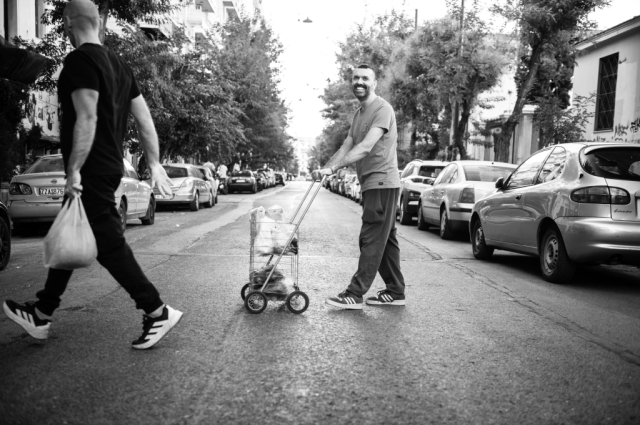 |
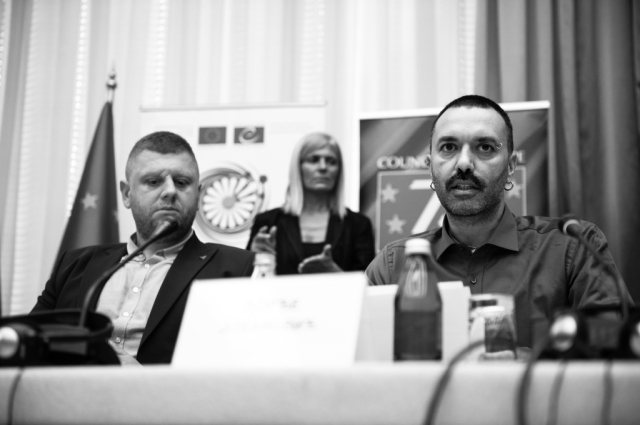 |
||
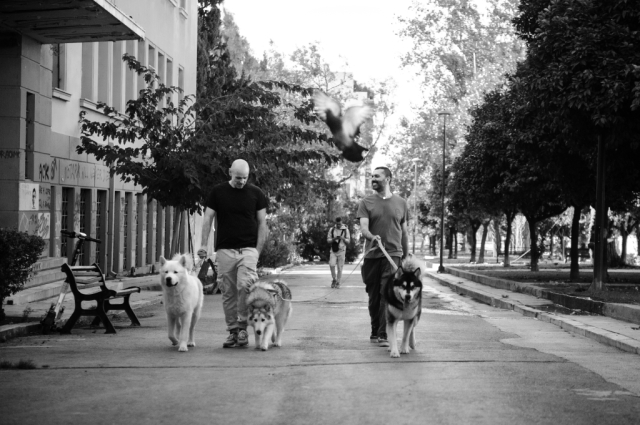 |
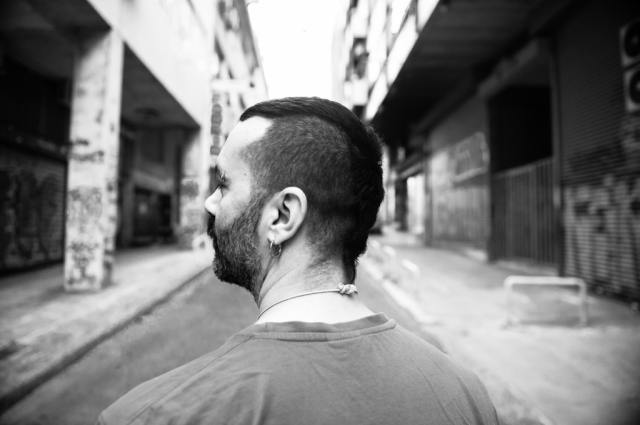 |
||
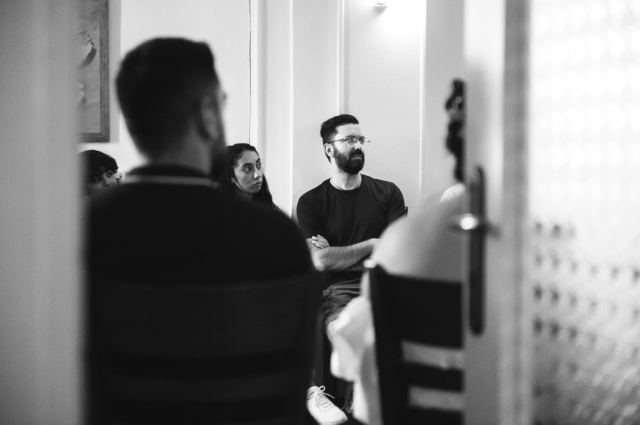 |
Click here to listen to other interviews.




